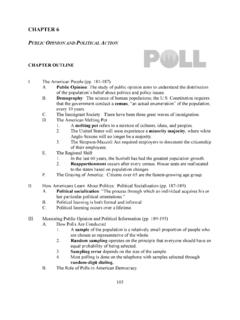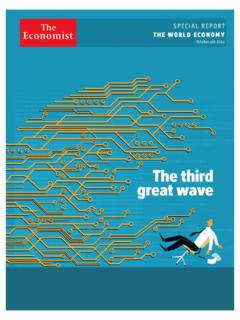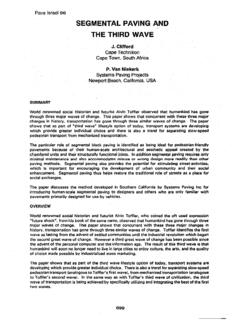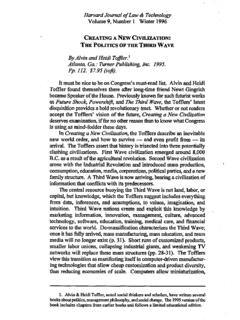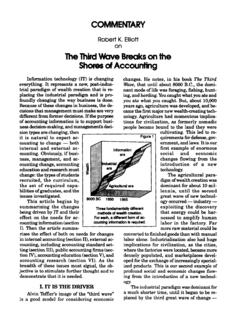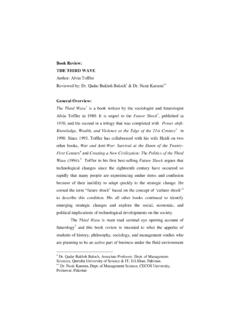Transcription of After Twenty Years: The Future of the Third Wave
1 Copyright 1997 National Endowment for Democracy and the Johns Hopkins University Press. All rights reserved. Journal of Democracy (1997) 3-12 After Twenty Years: The Future of the Third Wave Samuel P. Huntington Some five hundred years ago a small group of Portuguese leaders and thinkers--including King John II, Prince Henry the Navigator, Bartholomew Dias, and Vasco da Gama--acting with courage, determination, and imagination, inaugurated a new phase in human history, the age of discovery. They set an example that Spain, France, Britain, and the Netherlands were to follow.
2 Slightly more than two decades ago, M rio Soares and his colleagues, acting with comparable courage, determination, and imagination, inaugurated a new phase in human history, the age of democracy. They too set an example that Spain, Greece, Brazil, and many other countries have followed. This result, however, was not foreordained. Chaos and conflict existed in Portugal in the months following the military's overthrow of the dictatorship in April 1974. At that time the prospects for democracy did not seem bright, and many thought that Portugal's Stalinist communist party would come to power.
3 This pessimism was shared by Secretary of State Henry Kissinger. When M rio Soares, then foreign minister in the provisional government, visited Kissinger, the latter [End Page 3] berated him and his government for not taking a stronger line against the communists. "You are a Kerensky," Kissinger said, "I believe your sincerity, but you are naive." To which Soares replied: "I certainly don't want to be a Kerensky." And Kissinger shot back: "Neither did Kerensky." 1 M rio Soares and his colleagues, however, proved Kissinger wrong.
4 In Portugal, the Kerenskys won, democracy was consolidated, and M rio Soares went on to be prime minister and later president. The Third wave of democratization that Portugal initiated literally created the age of democracy, in which for the first time in history more than half the countries in the world have some form of democratic government. Let us briefly look at the record. The first, long wave of democratization that began in the early nineteenth century led to the triumph of democracy in some 30 countries by 1920. Renewed authoritarianism and the rise of fascism in the 1920s and 1930s reduced the number of democracies in the world to about a dozen by 1942.
5 The second, short wave of democratization After the Second World War again increased the number of democracies in the world to somewhat over 30, but this too was followed by the collapse of democracy in many of these countries. The Third wave of democratization that began in Portugal has seen democratization occur much faster and on a scale far surpassing that of the previous two waves . Two decades ago, less than 30 percent of the countries in the world were democratic; now more than 60 percent have governments produced by some form of open, fair, and competitive elections.
6 A quarter-century ago, authoritarian governments--communist politburos, military juntas, personal dictatorships--were the rule. Today, hundreds of millions of people who previously suffered under tyrants live in freedom. In addition, since democracies historically have not warred with other democracies, there has been a major expansion of the zone of peace in the world and a reduction in the likelihood of interstate conflict. This dramatic growth of democracy in such a short time is, without doubt, one of the most spectacular and important political changes in human history.
7 But what about the Future ? Will democracy become consolidated in the countries where it has recently emerged? Will more countries become democratic? Are we about to see a world in which democracy is not only the predominant system of government but the universal system of government? Economics and Culture The answers to these questions, I believe, depend largely on two factors: economic development and the receptivity to democracy of non-Western cultures. [End Page 4] First, as we all know, an extremely high correlation exists between levels of democracy and levels of economic development.
8 Setting aside the oil-rich states as a special case, all the wealthiest countries in the world, except Singapore, are democratic, and almost all the poorest countries in the world, with the notable exception of India and perhaps one or two others, are not democratic. The countries at intermediate levels of economic development are in some cases democratic and in other cases not. Yet correlation, as we know, does not prove causation. Hence we are left with a set of questions: Does economic growth produce democracy? Does democracy produce economic growth?
9 Or are economic growth and democratization both products of some other cause or independent variable? As Seymour Martin Lipset pointed out decades ago, the evidence is overwhelming that economic development has a strong positive effect on democratization. 2 In short, if you wish to produce democracy, promote economic growth. There are several reasons for this relationship. Economic development involves higher levels of urbanization, literacy, and education. It also involves a shift in occupational structure, with a decline in the size and importance of the peasantry and the development of a middle class and an urban working class.
10 The latter groups increasingly want a voice in and influence over policies that affect them. With higher levels of education, they are able to organize trade unions, political parties, and civic associations to promote their interests. Second, economic development produces more resources, public and private, for distribution among groups in society. Politics becomes less of a zero-sum game, and hence compromise and toleration are encouraged. Third , economic growth produces a more complex economy that becomes increasingly difficult for the state to control; as we have seen in the case of the command economies, state control can only be maintained at the price of economic stagnation.



